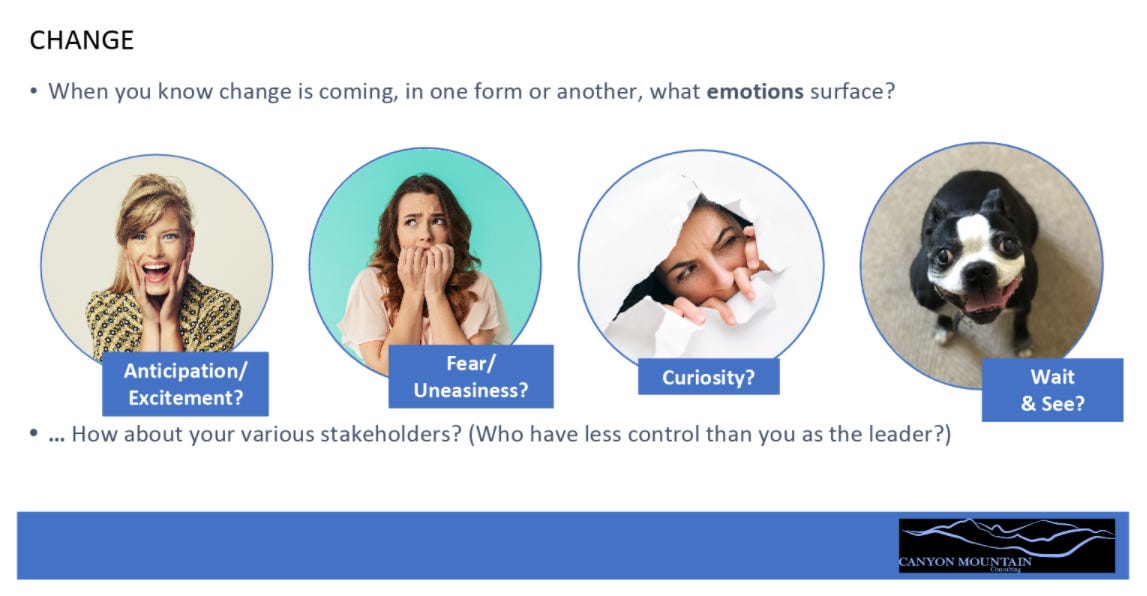Rod Ray: Change: Expect It, Embrace It, Learn From It
The Crises Oregonians have faced this past year have forced immense Change on us all. The coming Changes can be opportunities for building a more resilient and stronger Oregon Way.
Housekeeping
Next week’s post include Kelley Minty Morris, Ginger L. Savage, and Kevin Frazier.
Block out some time for Chapter 4 of Rediscovering the Oregon Way tomorrow.
Send ideas for contributors and how we can improve to Kevin! kfraz@berkeley.edu
Now to the post!**
Rod Ray is the former CEO of Bend Research, Inc., a Ph.D. Chemical Engineer, and a "Courtesy Professor" at OSU-Cascades, where he teaches Leadership, Strategic Planning, and Thermodynamics.
Over the last year, we Oregonians have experienced massive Change. The transition to a New Year has not diminished the fact that we continue to experience this Change personally. What’s more, every day, the media reminds us of this Change: our lifestyles and freedoms are constantly Changing, there is significant political Change, our economics are Changing, and even our interactions with friends and neighbors are Changing. And, one thing we can count on in our near- and mid-term future is more Change.

Change and emotions
When you know Change is coming, what emotions surface for you?
Change and people
In any family, business, or group, there are “stakeholders”: folks who are directly affected by the Change itself, and the approach or response to the Change. As a Change surfaces or the need for Change becomes apparent, there will be a response from the stakeholders driven by the uncertainty inherent in Change.
Depending on personality, situation, experience(s) and the nature of the Change, each stakeholder will anticipate and react to Change in a different way. Empathy toward your stakeholders is key—one person’s anticipation or curiosity for the outcome of an imminent Change is another person’s fear-response or just “wait-and-see.” Your friends, kids, family, colleagues will each experience a different set of emotions and will need your support through Change—each in a different way.
Change and the “other side”
Helping “stakeholders” to visualize the “other side” of the Change is critical to help them cope with its ramifications. Here are some key questions to help stakeholders visualize the other side:
What are the possible outcomes?
What are the key challenges to be met in a given Change?
And, most importantly, what are the opportunities inherent in the Change?
Over this last year in Oregon, we have all watched some businesses fail to weather the Changes (often due to circumstance over which they have little control). We have also all watched other businesses pivot successfully and survive the Changes in their business environments and even thrive.
Some families have experienced tragedy driven by Change; some families have grown stronger and thrived; and, some heroic folks have done both.
Often, the approach-to-Change—the response—can make all the difference.

Change and resistance and opportunity
As the Change emerges and becomes defined and clear, you and your stakeholders will craft an approach or response to the Change. And there will naturally be resistance from the stakeholders to the very fact that things will Change, the approach-to-Change or the response.
During times of Change, resistance (passive—“wait and see”; or aggressive—fear or outright direct resistance) will surface. There is much to be learned from this resistance. Resistance is inevitable and should be expected—“hoping” there will be no resistance, or resenting resistance when it comes is not helpful.
Resistance is a form of feedback from stakeholders. In a given business or home situation, stakeholders will often know what will work and what won’t work. Instead of frustration with resistance, it’s far better to seek the “Truth” as to the basis for the resistance to the approach-to-Change, and learn from it. This will often “teach” a better way to react and even exploit the Change, win buy-in from the stakeholders, and result in the best outcome possible.
With some other stakeholders (especially in times like these) resistance may be coming from personal situations where they are grappling with survival issues—e.g., health, shelter, food or relationships. You may not be aware of these issues and may be puzzled or frustrated by the resistance.
Careful and compassionate questions and support will surface these issues; in other words: empathy. And, again, there is much to be learned from getting to the “truth” or heart of the fundamental resistance to the approach-to-Change.
It is much better to anticipate resistance, embrace it, value it, and learn from it.
More Change is Coming
In these times of significant and relentless Change, you have an opportunity to point the way to the new Vision—the “other side” of the Change. Crave resistance…ask a lot of questions and really listen to the answers. Get the best out of the knowledge, experience, judgement, and point-of-view of the stakeholders. And encourage them to engage on the approach/response to the Change, adjust as necessary, and make it work—not stand by and observe.
The Crises Oregonians have faced this past year have forced immense Change on us all. And the one thing we can be sure of about 2021 is that there will be more surprises—some anticipated, some unanticipated. The coming Changes can be opportunities for building a more resilient and stronger Oregon Way…so long as we prioritize empathy, anticipate resistance, and learn from and engage with our stakeholders.
For our leaders in Salem and in communities around the state, our collective response to Change should be formulated and implemented only after doing the hard work of listening to stakeholders.
**Some of the ideas in this essay are based on Harvard Business Review articles on change by John P. Kotter (Leading Change: Why Transformation Efforts Fail), and Jeffrey D. Ford and Laurie W. Ford (Decoding Resistance to Change).
****************************************
Keep the conversation going:
Facebook (facebook.com/oregonway)
Twitter (@the_oregon_way)
Check out our podcast:
#131



